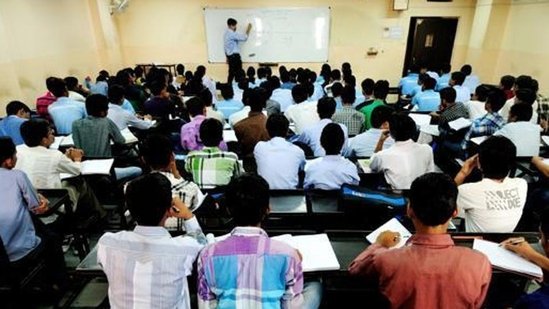
Kota, a city in Rajasthan, has for years been known as the coaching capital of India, attracting lakhs of students who come here to prepare for competitive exams like IIT-JEE and NEET. The city’s rise as a hub for education brought with it a massive boost to its local economy, as businesses, landlords, and workers thrived on student demand. However, in recent times, Kota has seen a sharp drop in student enrollment, and this change is causing major disruption across the city. The once-bustling town is now struggling, as the very population it depended on begins to dwindle.
The decline in student numbers is not just affecting coaching centers, but is also having a significant impact on hostel owners, mess workers, transport services, and small vendors. With fewer students arriving each academic season, Kota’s economy is beginning to show signs of distress. In response, coaching institutes are now intensifying their marketing efforts like never before in an attempt to bring students back to the city. Let us explore what has led to this situation, how the local population is being affected, and what the future looks like for Kota.
Mental Health Crisis and Kota’s Stressful Atmosphere
One of the primary reasons behind the drop in student numbers is the increasing awareness of mental health issues among students. Kota has unfortunately been in the news for a series of student suicides, often blamed on the immense academic pressure, loneliness, and the fear of failure. Parents across the country are now more cautious about sending their children to a place that is perceived as being emotionally and psychologically exhausting.
Many students live far from home and are unable to cope with the highly competitive atmosphere. The routine of long study hours, strict schedules, and intense peer competition creates a high-stress environment. Over time, these pressures can affect a student’s mental stability. As a result, many families are now avoiding Kota altogether and are seeking safer, more supportive learning alternatives either closer to home or online.
The Rise of Online Coaching Platforms
Another major factor contributing to the drop in student enrollment in Kota is the boom of online education platforms. In the post-COVID world, companies like BYJU’S, Unacademy, PhysicsWallah, and Vedantu have revolutionized the way students prepare for exams. These platforms offer flexible learning, recorded lectures, interactive doubt-solving sessions, and mock tests, allowing students to prepare from the comfort of their homes.
This has especially benefited students from smaller towns and financially weaker backgrounds, as online education is significantly more affordable than moving to Kota, paying for hostels, food, and other living expenses. The success of these online platforms has posed a direct challenge to the traditional coaching setup of Kota.
Rising Cost of Living in Kota
For many families, the cost of living in Kota has become a major concern. Over the years, prices for hostel accommodation, tiffin services, coaching fees, and even basic transportation have continued to rise. This makes staying in Kota for one or two years a costly affair. The financial burden of living in the city is prompting families to look for budget-friendly alternatives. With online platforms offering high-quality courses at a fraction of the price, many parents and students find it more practical to stay home and study virtually.
Negative Publicity and Parental Fear
The constant media coverage of student suicides, exam pressure, and mental health breakdowns has further damaged Kota’s image. While the city has tried to introduce wellness initiatives and counseling services, the perception of Kota as a “pressure cooker” remains. Parental fear plays a strong role in this decision-making process. No parent wants to risk their child’s mental or emotional well-being, and as a result, many now choose to keep their children away from Kota.
Impact on Kota’s Local Economy
Kota’s local economy is deeply dependent on its student population. With a sharp fall in student numbers, the ripple effects are being felt across various sectors. Hostels and PG accommodations that were once fully booked throughout the year now lie vacant. In desperation, some owners are offering discounted rents, free first-month stays, or meal packages to attract the few students still arriving in the city.
The mess and food industry is also badly hit. Earlier, many mess services catered to hundreds of students daily, but now they are operating at 30–40% capacity. Some mess owners have shut down completely, while others are trying to sustain themselves by joining online food delivery platforms like Zomato and Swiggy.
The fall in student numbers has also impacted small business owners. Stationery shops, photocopy centers, cycle repair shops, and tea stalls that once flourished near coaching hubs are now seeing minimal footfall. Many of these businesses are on the verge of closing down. Moreover, part-time jobs that were offered to locals by coaching centers or messes have now disappeared, leading to unemployment and even migration of workers to other cities in search of better opportunities.
Coaching Institutes Ramp Up Marketing to Stay Relevant
In the face of this crisis, coaching institutes in Kota are trying to rebrand and promote themselves more aggressively. Earlier, these institutes relied on their reputation and word-of-mouth referrals. Now, they are launching full-fledged digital marketing campaigns to draw students.
Institutes like Allen, Resonance, and Motion are running ads on YouTube, Instagram, and Google, showing success stories of top rankers, friendly hostel environments, and stress-free preparation methods. These campaigns aim to present Kota as a city of success and ambition rather than stress and depression.
Some institutes are collaborating with popular educational YouTubers and influencers to create content showcasing student life in Kota. They are investing in video tours of classrooms, hostels, and campus facilities to rebuild trust and transparency.
Many coaching centers are also introducing new scholarship schemes, free demo classes, and installment-based fee plans to help students financially. There is now a focus on mental health and well-being, with institutes hiring professional counselors, organizing weekly mental wellness sessions, and adding recreational spaces in hostels to promote better balance in students’ lives.
Student and Parent Voices Reflect the Changing Mood
When speaking to students and their parents, it is clear that opinions are divided. Some believe that Kota’s disciplined environment, peer competition, and direct teacher guidance make it the best place to prepare for competitive exams. For these students, the city continues to be a land of opportunity.
However, others are choosing to stay home. Pragati Sharma, a NEET aspirant from Lucknow, shared that while Kota offers good teachers, she could not handle the pressure and preferred to study through online classes. Her father supported her decision, saying that they saved nearly ₹2 lakh by avoiding hostel fees and daily expenses.
This changing mindset reflects a larger national trend where families are placing emotional well-being above educational reputation.
Government and Administration Intervention
Realizing the seriousness of the situation, the Kota district administration and Rajasthan government are stepping in. Initiatives such as mental health helplines, regular checks on hostel environments, and student feedback systems are being rolled out. Coaching centers are being encouraged to adopt student-friendly policies and create a more balanced environment where learning and mental health go hand in hand.
The administration has also directed coaching institutes to reduce academic load, limit class hours, and promote extracurricular activities to help reduce burnout among students.
The Future of Kota: Crisis or Opportunity?
Kota now stands at a crossroads. The current crisis has exposed the risks of relying too heavily on one industry and one demographic. However, this could also be a turning point for the city. If Kota learns to prioritize student well-being, embrace hybrid learning models, and diversify its economy, it can not only recover but grow stronger.
The aggressive marketing strategies being used by coaching centers may bring in short-term results, but the long-term solution lies in building a safe, affordable, and supportive educational ecosystem. Kota must listen to its students and parents and work toward a system where excellence is achieved through encouragement, not pressure.
The student enrollment drop in Kota has shaken the city to its core. The local economy is struggling, businesses are shutting down, and the city’s image is at risk. But all is not lost. With timely action, sincere reforms, and a focus on student happiness, Kota can bounce back. The journey ahead may be tough, but it also offers an opportunity for Kota to reinvent itself as not just a coaching hub—but a center for holistic, happy learning.


































